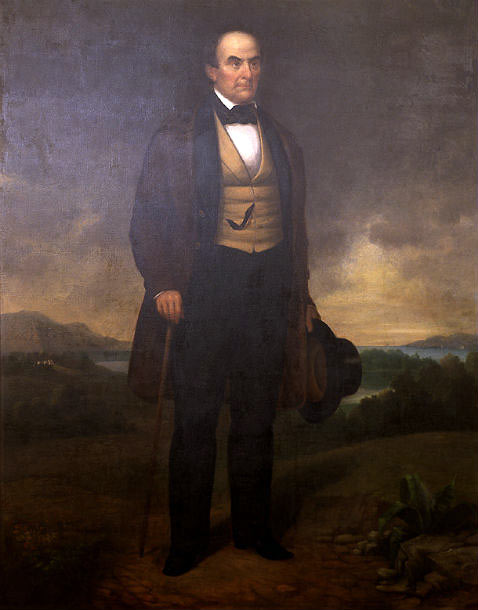Profiles in Courage
Written by then-Senator John F. Kennedy
Profiles in Courage is a 1956 volume of short biographies describing acts of bravery and integrity by eight United States Senators under enormous pressure from their parties and their constituents. Written by then-Senator John F. Kennedy, who won the Pulitzer Prize for the work. The staff at Traveling Boy suggests that Utah Republican Senator Mitt Romney might fit the bill as a Profile in Courage due to his recent vote to convict fellow Republican Donald Trump in the Senate Impeachment trial. He was unable to stand in line with other Republic Senators as a result of his deeply-felt oath of office, the US Constitution and personal relationship with God.
The subjects of Profiles in Courage are John Quincy Adams, Daniel Webster, Thomas Hart Benton, Sam Houston, Edmund G. Ross, Lucius Lamar, George Norris, and Robert A. Taft. Each chapter from the book is summarized below.
 John Quincy Adams came to the Senate as a Massachusetts Federalist in 1803. He quickly broke with his party, however, when he was the sole Federalist to vote in favor of the Louisiana Purchase. Adams continued voting against his party, but it was not until 1807 that the final split between Adams and the Federalists occurred. That year, Thomas Jefferson called upon Congress to enact an embargo against Great Britain to shut off international trade to retaliate against British aggression towards American merchant ships. The embargo would have had a disastrous effect upon the economy of Massachusetts. Adams agreed with Jefferson and helped steer the embargo bill to its enactment into law. This was in direct opposition to the Federalists, who had been following a philosophy of appeasement towards the British. A storm of protest ensued and Adams resigned from his seat in 1808.
John Quincy Adams came to the Senate as a Massachusetts Federalist in 1803. He quickly broke with his party, however, when he was the sole Federalist to vote in favor of the Louisiana Purchase. Adams continued voting against his party, but it was not until 1807 that the final split between Adams and the Federalists occurred. That year, Thomas Jefferson called upon Congress to enact an embargo against Great Britain to shut off international trade to retaliate against British aggression towards American merchant ships. The embargo would have had a disastrous effect upon the economy of Massachusetts. Adams agreed with Jefferson and helped steer the embargo bill to its enactment into law. This was in direct opposition to the Federalists, who had been following a philosophy of appeasement towards the British. A storm of protest ensued and Adams resigned from his seat in 1808.
 Daniel Webster was a Massachusetts senator (Whig) and one of the most distinguished members in Senate history. His trial by fire began in 1850 when he agreed to help Henry Clay of Kentucky push through a compromise bill that would keep the Union together. Webster’s famous “Seventh of March” speech in favor of Clay’s compromise bill asserted that slaveholders were entitled to property rights, that fugitive slave laws should be strengthened, and that the issue of slavery should be put aside in order to keep the Union together at all costs. The speech enraged his constituents and ended his career as a Senator, since Webster knew that his speech would make him unelectable in Massachusetts thereafter. On July 22, 1850, Webster resigned from the Senate to become secretary of state.
Daniel Webster was a Massachusetts senator (Whig) and one of the most distinguished members in Senate history. His trial by fire began in 1850 when he agreed to help Henry Clay of Kentucky push through a compromise bill that would keep the Union together. Webster’s famous “Seventh of March” speech in favor of Clay’s compromise bill asserted that slaveholders were entitled to property rights, that fugitive slave laws should be strengthened, and that the issue of slavery should be put aside in order to keep the Union together at all costs. The speech enraged his constituents and ended his career as a Senator, since Webster knew that his speech would make him unelectable in Massachusetts thereafter. On July 22, 1850, Webster resigned from the Senate to become secretary of state.
 Thomas Hart Benton, senator from Missouri, was included in the book primarily for his actions in 1847-1849 against John C. Calhoun’s resolutions to keep Congress from interfering with the introduction of slavery in new territories. Although Missouri was a slave-owning state, and Benton himself owned slaves, he was deeply opposed to the introduction of slavery into new territories. Benton was concerned that the issue was being exploited by Southern and Northern partisans and would be a barrier to western expansion. Calhoun was successful in getting legislators from slave-owning states, including the rest of the Missouri delegation, to back his resolutions. Benton’s refusal to vote for Calhoun’s resolutions cost him the popularity he previously had in his state, and he was stripped of all of his committee memberships except Foreign Relations. In 1850, Benton was still opposed to the series of measures known as the Great Compromise and did not hesitate to make his feelings known in the strongest possible terms. However, Benton was constantly called out of order by Vice President Millard Fillmore, the presiding officer. On April 17, 1850, when Fillmore called Benton out of order again, debate became so heated that Benton was almost shot by Henry Foote of Mississippi. Benton was voted out of office in 1851, returned to Congress in 1853 as a representative, but lost his seat in 1855 and spent the remaining years of his life fruitlessly seeking a return to public office. Although his uncompromising stand on prohibiting slavery in new territories ended his political career, the wisdom of Benton’s opinion was borne out a few years later and was one of the factors that kept Missouri from seceding from the Union.
Thomas Hart Benton, senator from Missouri, was included in the book primarily for his actions in 1847-1849 against John C. Calhoun’s resolutions to keep Congress from interfering with the introduction of slavery in new territories. Although Missouri was a slave-owning state, and Benton himself owned slaves, he was deeply opposed to the introduction of slavery into new territories. Benton was concerned that the issue was being exploited by Southern and Northern partisans and would be a barrier to western expansion. Calhoun was successful in getting legislators from slave-owning states, including the rest of the Missouri delegation, to back his resolutions. Benton’s refusal to vote for Calhoun’s resolutions cost him the popularity he previously had in his state, and he was stripped of all of his committee memberships except Foreign Relations. In 1850, Benton was still opposed to the series of measures known as the Great Compromise and did not hesitate to make his feelings known in the strongest possible terms. However, Benton was constantly called out of order by Vice President Millard Fillmore, the presiding officer. On April 17, 1850, when Fillmore called Benton out of order again, debate became so heated that Benton was almost shot by Henry Foote of Mississippi. Benton was voted out of office in 1851, returned to Congress in 1853 as a representative, but lost his seat in 1855 and spent the remaining years of his life fruitlessly seeking a return to public office. Although his uncompromising stand on prohibiting slavery in new territories ended his political career, the wisdom of Benton’s opinion was borne out a few years later and was one of the factors that kept Missouri from seceding from the Union.
 Sam Houston earned his place in Profiles in Courage by his refusal to support the Kansas-Nebraska Act of 1854. This bill repealed the Missouri Compromise of 1820 and would have allowed the residents of territories from Iowa to the Rocky Mountains to decide the slavery issue themselves. A Southerner by birth and one of the first two senators from Texas, Houston felt that the act would further divide the Union. Throughout the 1840s, Houston had upset many Southern Democrats by tangling with the powerful John C. Calhoun, saying that Calhoun was trying to destroy the Union by introducing his “hands off” slavery legislation. The “last straw” was Houston’s vote against the Kansas-Nebraska Act. He was the only Southern Democrat to vote no. Houston’s constituents were furious and rumors of his political demise were rampant. Not one to engage in a defensive fight, Houston announced his plan to run for governor of Texas as an independent while he was still in the Senate. Despite his oratorical gifts and sheer physical presence, the citizens of Texas did not forget his “anti-Southern” vote against the Kansas-Nebraska Act. Houston was defeated for the governorship and was dismissed from the Senate by the Texas legislature in 1857. However, two years later he was asked to come out of retirement to again run for governor of Texas, and his election was a major setback to Southern pro-slavery extremists. In February 1861, despite Houston’s valiant attempts to stop it, the Texas legislature voted to secede from the Union. His refusal to take the oath of allegiance to the Confederacy led to his ouster as governor in March 1861.
Sam Houston earned his place in Profiles in Courage by his refusal to support the Kansas-Nebraska Act of 1854. This bill repealed the Missouri Compromise of 1820 and would have allowed the residents of territories from Iowa to the Rocky Mountains to decide the slavery issue themselves. A Southerner by birth and one of the first two senators from Texas, Houston felt that the act would further divide the Union. Throughout the 1840s, Houston had upset many Southern Democrats by tangling with the powerful John C. Calhoun, saying that Calhoun was trying to destroy the Union by introducing his “hands off” slavery legislation. The “last straw” was Houston’s vote against the Kansas-Nebraska Act. He was the only Southern Democrat to vote no. Houston’s constituents were furious and rumors of his political demise were rampant. Not one to engage in a defensive fight, Houston announced his plan to run for governor of Texas as an independent while he was still in the Senate. Despite his oratorical gifts and sheer physical presence, the citizens of Texas did not forget his “anti-Southern” vote against the Kansas-Nebraska Act. Houston was defeated for the governorship and was dismissed from the Senate by the Texas legislature in 1857. However, two years later he was asked to come out of retirement to again run for governor of Texas, and his election was a major setback to Southern pro-slavery extremists. In February 1861, despite Houston’s valiant attempts to stop it, the Texas legislature voted to secede from the Union. His refusal to take the oath of allegiance to the Confederacy led to his ouster as governor in March 1861.
 Edmund Ross, a Kansas Republican, cast the deciding vote that ended the impeachment proceedings against President Andrew Johnson. The proceedings began because doctrinaire “Radical Republicans,” then in control of the Senate, passed a Tenure of Office Act to prevent a president from firing cabinet members without Senate consent. This was done to try to stop Johnson from firing Secretary of War Edwin Stanton. Johnson believed Stanton was a tool of the Radicals who wanted to establish a military dictatorship in the South. Johnson felt the wiser course would be to reconstruct the Confederate states back into the Union as quickly as possible without unnecessary military intervention, as Lincoln had intended. When Johnson fired Stanton, the impeachment began. The House voted for impeachment and the trial then moved to the Senate. As the trial went on it became clear that the Republicans had no intention of giving Johnson a fair trial; rather, their emphasis was on convincing enough senators to find Johnson guilty. Ross was overheard saying that while he had no sympathy for Johnson, he would do his best to see that he was fairly tried. Because Ross had previously been such a partisan Republican, he became the principal target of abuse from the press, the public, and his fellow Republican legislators. Nonetheless, Ross voted against convicting Johnson, reasoning that if a president could be forced out of office by insufficient evidence that was based on partisan disagreement, the presidency would then be under the control of whatever congressional faction held sway. Ross’s action unleashed relentless criticism. Neither he nor any other Republican who voted to acquit Andrew Johnson was reelected to the Senate, and Ross and his family suffered ostracism and poverty upon their return to Kansas in 1871. Eventually, Ross was vindicated by the Supreme Court, which declared the Tenure of Office Act to be unconstitutional, and praised by the press and the public for having saved the country from dictatorship.
Edmund Ross, a Kansas Republican, cast the deciding vote that ended the impeachment proceedings against President Andrew Johnson. The proceedings began because doctrinaire “Radical Republicans,” then in control of the Senate, passed a Tenure of Office Act to prevent a president from firing cabinet members without Senate consent. This was done to try to stop Johnson from firing Secretary of War Edwin Stanton. Johnson believed Stanton was a tool of the Radicals who wanted to establish a military dictatorship in the South. Johnson felt the wiser course would be to reconstruct the Confederate states back into the Union as quickly as possible without unnecessary military intervention, as Lincoln had intended. When Johnson fired Stanton, the impeachment began. The House voted for impeachment and the trial then moved to the Senate. As the trial went on it became clear that the Republicans had no intention of giving Johnson a fair trial; rather, their emphasis was on convincing enough senators to find Johnson guilty. Ross was overheard saying that while he had no sympathy for Johnson, he would do his best to see that he was fairly tried. Because Ross had previously been such a partisan Republican, he became the principal target of abuse from the press, the public, and his fellow Republican legislators. Nonetheless, Ross voted against convicting Johnson, reasoning that if a president could be forced out of office by insufficient evidence that was based on partisan disagreement, the presidency would then be under the control of whatever congressional faction held sway. Ross’s action unleashed relentless criticism. Neither he nor any other Republican who voted to acquit Andrew Johnson was reelected to the Senate, and Ross and his family suffered ostracism and poverty upon their return to Kansas in 1871. Eventually, Ross was vindicated by the Supreme Court, which declared the Tenure of Office Act to be unconstitutional, and praised by the press and the public for having saved the country from dictatorship.
 Lucius Lamar, Democrat from Mississippi, gave a eulogy on the House floor as a freshman representative in 1874 upon the death of Senator Charles Sumner of Massachusetts. Sumner was hated by most Southerners because of his opposition to slavery and his vehemence in denouncing slaveholders. In 1856 Sumner was brutally caned on the Senate floor by Representative Preston Brooks of South Carolina. Later in his career Sumner’s views towards the South became more moderate. Lamar’s eulogy, which praised Sumner’s desire for unity between North and South, was a sensation and many in the South felt it a betrayal. In 1876, Lamar was elected to the Senate and once again acted in opposition to his constituents and his party when he agreed to the findings of an election commission that gave the presidency to Republican Rutherford Hayes. The commission’s findings were controversial, but Lamar felt that acquiescing to them would stave off another sectional controversy that might have meant more bloodshed. He further alienated the people of Mississippi when he voted against free silver measures that would have enriched the state in the short run. However, Lamar kept his Senate seat until 1885, when he resigned to become secretary of the interior and finally, a justice of the Supreme Court.
Lucius Lamar, Democrat from Mississippi, gave a eulogy on the House floor as a freshman representative in 1874 upon the death of Senator Charles Sumner of Massachusetts. Sumner was hated by most Southerners because of his opposition to slavery and his vehemence in denouncing slaveholders. In 1856 Sumner was brutally caned on the Senate floor by Representative Preston Brooks of South Carolina. Later in his career Sumner’s views towards the South became more moderate. Lamar’s eulogy, which praised Sumner’s desire for unity between North and South, was a sensation and many in the South felt it a betrayal. In 1876, Lamar was elected to the Senate and once again acted in opposition to his constituents and his party when he agreed to the findings of an election commission that gave the presidency to Republican Rutherford Hayes. The commission’s findings were controversial, but Lamar felt that acquiescing to them would stave off another sectional controversy that might have meant more bloodshed. He further alienated the people of Mississippi when he voted against free silver measures that would have enriched the state in the short run. However, Lamar kept his Senate seat until 1885, when he resigned to become secretary of the interior and finally, a justice of the Supreme Court.
 George Norris, a Republican from Nebraska, first came to national attention in 1910 as a young representative. He introduced a reform resolution that would strip Speaker Joe Cannon of much of his power by taking away his authority to appoint committee members and their chairmen and by removing the Speaker from the Rules Committee. To everyone’s surprise, Norris was able to get enough votes to pass his resolution for a rule change, and the power of “Czar” Cannon began to wane. This move made him extremely unpopular with Cannon, as well as with some other members of the Nebraska delegation, and showed early on that Norris was not afraid to stand up to powerful individuals. In January 1917, President Woodrow Wilson asked Congress to authorize him to arm American merchant ships, many of which had been searched and sunk despite the fact that the United States was still officially neutral in the war at that time. Although Wilson’s request was immediately popular with the American public, Norris and Wisconsin senator Robert La Follette fought against the measure. Norris was an isolationist and a pacifist who felt that Wilson’s bill was a ruse by big business to get the United States into the war in Europe, and believed Wilson was trying to stampede the public into pressuring the Senate to pass his bill and enter the war. La Follette and Norris filibustered the bill and kept it from passing, but their victory was short-lived: Wilson stated that executive power already included the right to arm ships without congressional approval. Norris was the only member of the Nebraska delegation to vote against passage of the bill and he was excoriated on every side. He wrote the governor of Nebraska and offered to resign from the Senate, saying that if the people of Nebraska no longer felt that he was representing them adequately, he should step down. Norris traveled throughout Nebraska to explain his views to his constituents, and in the end, the governor declared that he would not ask for a special election. Norris touched off a firestorm of criticism in 1928 when he, a “dry” Republican, backed Al Smith, a Catholic Democrat who was anti-Prohibition, for president rather than Herbert Hoover, the Republican candidate. Smith’s liberal views touched a chord in Norris, who felt that the only place for progressive Republicans like him was in the Smith camp, rather than with Hoover, whom Norris felt was owned by monopolistic power companies. Norris went on to serve in the Senate until his defeat for re-election in 1942.
George Norris, a Republican from Nebraska, first came to national attention in 1910 as a young representative. He introduced a reform resolution that would strip Speaker Joe Cannon of much of his power by taking away his authority to appoint committee members and their chairmen and by removing the Speaker from the Rules Committee. To everyone’s surprise, Norris was able to get enough votes to pass his resolution for a rule change, and the power of “Czar” Cannon began to wane. This move made him extremely unpopular with Cannon, as well as with some other members of the Nebraska delegation, and showed early on that Norris was not afraid to stand up to powerful individuals. In January 1917, President Woodrow Wilson asked Congress to authorize him to arm American merchant ships, many of which had been searched and sunk despite the fact that the United States was still officially neutral in the war at that time. Although Wilson’s request was immediately popular with the American public, Norris and Wisconsin senator Robert La Follette fought against the measure. Norris was an isolationist and a pacifist who felt that Wilson’s bill was a ruse by big business to get the United States into the war in Europe, and believed Wilson was trying to stampede the public into pressuring the Senate to pass his bill and enter the war. La Follette and Norris filibustered the bill and kept it from passing, but their victory was short-lived: Wilson stated that executive power already included the right to arm ships without congressional approval. Norris was the only member of the Nebraska delegation to vote against passage of the bill and he was excoriated on every side. He wrote the governor of Nebraska and offered to resign from the Senate, saying that if the people of Nebraska no longer felt that he was representing them adequately, he should step down. Norris traveled throughout Nebraska to explain his views to his constituents, and in the end, the governor declared that he would not ask for a special election. Norris touched off a firestorm of criticism in 1928 when he, a “dry” Republican, backed Al Smith, a Catholic Democrat who was anti-Prohibition, for president rather than Herbert Hoover, the Republican candidate. Smith’s liberal views touched a chord in Norris, who felt that the only place for progressive Republicans like him was in the Smith camp, rather than with Hoover, whom Norris felt was owned by monopolistic power companies. Norris went on to serve in the Senate until his defeat for re-election in 1942.
 Robert A Taft, the son of William Howard Taft, was known as “Mr. Republican”: a conservative’s conservative, with presidential aspirations. Taft made a speech at Kenyon College in October 1946 called “Equal Justice Under Law” in which he strongly opposed the Nuremberg War Crimes Trials that were just ending. The defendants were the architects of the Nazi regime who had been found guilty of waging a war of aggression and had been sentenced to death. To Taft, the defendants were being tried under ex post facto laws (laws that apply retroactively, especially those which criminalize an action that was legal when it was committed). These laws are expressly forbidden in the U.S. Constitution (Article I, section 9 and section 10). Taft viewed the Constitution as the foundation of the American system of justice and felt that discarding its principles in order to punish a defeated enemy out of vengeance was a grave wrong. Speaking out against the Nuremberg Trials seemed quixotic at best and unpatriotic at worst. He was pilloried in the press, by his constituents, by legal experts, and by his fellow senators on both sides of the aisle. The fallout from the speech may have also played a small part in his unsuccessful presidential bid in 1948. However, Taft so strongly believed in the wisdom of the Constitution that speaking out was more important than his personal ambitions or popularity. Many years later, William O. Douglas of the Supreme Court agreed with Taft’s view that the Nuremberg Trials were an unconstitutional use of ex post facto laws.
Robert A Taft, the son of William Howard Taft, was known as “Mr. Republican”: a conservative’s conservative, with presidential aspirations. Taft made a speech at Kenyon College in October 1946 called “Equal Justice Under Law” in which he strongly opposed the Nuremberg War Crimes Trials that were just ending. The defendants were the architects of the Nazi regime who had been found guilty of waging a war of aggression and had been sentenced to death. To Taft, the defendants were being tried under ex post facto laws (laws that apply retroactively, especially those which criminalize an action that was legal when it was committed). These laws are expressly forbidden in the U.S. Constitution (Article I, section 9 and section 10). Taft viewed the Constitution as the foundation of the American system of justice and felt that discarding its principles in order to punish a defeated enemy out of vengeance was a grave wrong. Speaking out against the Nuremberg Trials seemed quixotic at best and unpatriotic at worst. He was pilloried in the press, by his constituents, by legal experts, and by his fellow senators on both sides of the aisle. The fallout from the speech may have also played a small part in his unsuccessful presidential bid in 1948. However, Taft so strongly believed in the wisdom of the Constitution that speaking out was more important than his personal ambitions or popularity. Many years later, William O. Douglas of the Supreme Court agreed with Taft’s view that the Nuremberg Trials were an unconstitutional use of ex post facto laws.
 John F. Kennedy had long been interested in the topic of political courage, beginning with his senior thesis at Harvard. The thesis, later published as Why England Slept, was a study of the failure of British political leaders in the 1930s to oppose popular resistance to rearming, leaving the country ill-prepared for World War II. Kennedy’s election to the House in 1946 and the Senate in 1952 gave him personal experience in dealing with the conflicting pressures that legislators face. When Kennedy took a leave of absence from the Senate in 1954 to recover from back surgery, it gave him the opportunity to study the topic of political courage. The project resulted in the publication of Profiles in Courage, which focuses on the careers of eight senators whom Kennedy felt had shown great courage under enormous pressure from their parties and their constituents. His own battles with physical pain and his experiences in World War II as a PT boat commander also gave him inspiration.
John F. Kennedy had long been interested in the topic of political courage, beginning with his senior thesis at Harvard. The thesis, later published as Why England Slept, was a study of the failure of British political leaders in the 1930s to oppose popular resistance to rearming, leaving the country ill-prepared for World War II. Kennedy’s election to the House in 1946 and the Senate in 1952 gave him personal experience in dealing with the conflicting pressures that legislators face. When Kennedy took a leave of absence from the Senate in 1954 to recover from back surgery, it gave him the opportunity to study the topic of political courage. The project resulted in the publication of Profiles in Courage, which focuses on the careers of eight senators whom Kennedy felt had shown great courage under enormous pressure from their parties and their constituents. His own battles with physical pain and his experiences in World War II as a PT boat commander also gave him inspiration.






















